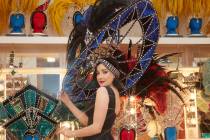Bassoonists band together for April Fools’ Day
What do you get when you put a bunch of bassoonists together in a big room?
It probably depends on the time and place, but in Las Vegas on Monday it will be Bright Light City Bassoons in their annual concert, and it’s likely to be a little wacky.
As is fitting for an April Fools’ Day concert, the 15 musicians will be in costume, following this year’s theme, “Bassooning with the Stars! So You Think You Can Play Bassoon …”
“This concert features a real mixture of playing levels: some professionals, some very good amateurs, UNLV students and some high school students,” said Janis McKay, professor of music at the University of Nevada, Las Vegas. “We choose a theme each year and create characters and costumes to match. Last year it was Broadway; this year is ‘Bassooning with the Stars,’ so the audience should expect to see lots of ‘B’ list celebrity costumes.”
The program is expected to include such songs as “St. Louis Blues,” “Viva Las Vegas!” “Baby Elephant Walk” and the Muppets’ theme song. McKay said the music is mostly on the lighter side, with one serious work written for the group by Beth Mehocic.
So how in the world did the whole thing get started? Following a tradition, it seems. McKay said the first such group probably was the Bubonic Plague Quartet, subtitled “a plague on music.”
“They were four very talented bassoonists in Boston who were looking for a way to challenge themselves while taking auditions to land an orchestra job,” she said. “They dressed in monk’s robes and wrote their own arrangements.” All of them, she said, went on to professional careers. McKay said there have been similar groups, such as the Boulder Bassoon Band.
“When I first started teaching at UNLV, I thought it would be a fun way to involve community professional and amateur bassoonists,” she said. “There are not that many of us, so it is always a good time when we can get a group of players together.”
Which begs the question: Why would one start studying the bassoon — not the most familiar of instruments — in the first place? Usually, McKay said, because the person either really loves the bassoon’s sound, or sees an opportunity because of the very fact that the instrument isn’t all that popular. In McKay’s case, she said, her band director asked her to play it.
“In general, band directors switch someone playing a more popular instrument, such as flute or saxophone, to the bassoon as needed,” she said. “A young bassoonist needs to be intelligent and very independent, able to progress on their own. A busy band director focuses their attention where the most bodies are.”
But the payback is great, she said.
“The instrument is difficult to play but rewarding,” she said. “It produces a mellow tone that ranges from the bass range into the upper tenor range; many opera composers use the bassoon because of its similarity to the human male voice.”
She added that the bassoon is one of the most versatile instruments in the orchestra, capable of anything from melodic lines to comic effects. Maybe that’s one reason a finely tuned sense of humor seems to be a prerequisite to becoming a bassoonist.
“In general, bassoonists have a sense of humor because we have to,” she said. “There are so few of us, and most people have no idea what it is that we do.”
That humor is guaranteed to come out Monday, thanks to song selection as well as costumes.
“With so many variables, it is always an adventure and something of a free-for-all,” McKay said. “Those looking for serious art should look elsewhere, but our audience usually has a great time.”
Contact reporter Heidi Knapp Rinella at hrinella@review journal.com or 702-383-0474.
PREVIEW
What: Bright Light City Bassoons’ annual April Fool’s Day concert
When: 7:30 p.m. Monday
Where: Doc Rando Recital Hall in UNLV’s Beam Music Center
Admission: Free


















